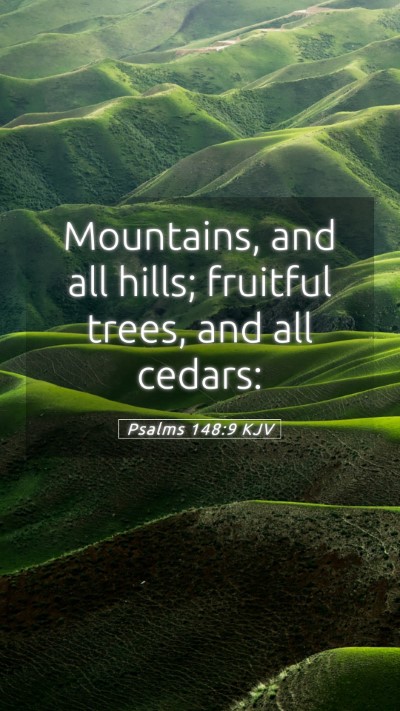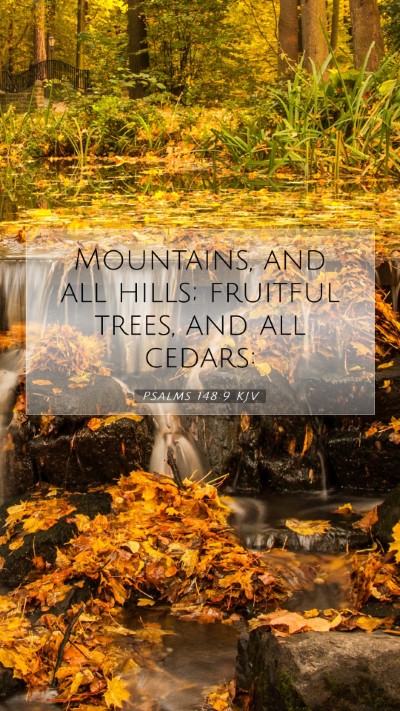Bible Verse Commentary: Psalms 148:9
Psalms 148:9 states, "Mountains and all hills; fruitful trees and all cedars." This verse fits into the larger theme of Psalm 148, which is a grand call to creation to praise the Lord. Each element of creation—from the highest mountains to the smallest plant—has a role in glorifying God.
Verse Meaning and Significance
The primary focus of Psalms 148:9 is on the natural world, emphasizing how both the grandeur of mountains and the simplicity of trees contribute to the universal chorus of praise to the Creator. Here are some insights from notable commentaries:
-
Matthew Henry:
Henry emphasizes the beauty and majesty of nature as reflectors of God's glory. He interprets the mountains and hills as symbols of stability and strength, suggesting that just as they stand firm, so too should our devotion be steadfast toward God.
-
Albert Barnes:
Barnes discusses the diversity of creation, pointing out that whether grand or humble, every part of the natural world has a purpose. He notes that this verse invites the faithful to recognize the splendor of creation and consider how it harmonizes with divine praise.
-
Adam Clarke:
Clarke provides a detailed analysis of the trees mentioned in the verse, tying them to God's provision and sustenance. He suggests that fruitful trees symbolize the bounty of nature, which also resonates with spiritual sweetness as a reflection of God's rich blessings.
In-Depth Bible Verse Analysis
In analyzing Psalms 148:9, it is essential to understand the historical and literary context. This psalm stands as a celebration of creation's testimony to God's glory. Each category of creation mentioned serves as a reminder that all living and non-living things exist to reflect the nature of the Creator.
Understanding Creation's Role in Praise
The very structure of the psalm reflects a crescendo of praise, beginning with the heavens and ending with the earth. Psalms 148:9 specifically highlights:
- The Mountains: Represent vastness and permanence. They serve as a metaphor for God's unchanging nature.
- The Hills: Symbolize gentleness and the nurturing aspects of creation, illustrating that even the smaller features of nature play a vital role in the earthly tapestry of praise.
- Fruitful Trees: These indicate productivity and blessings, reminding readers of God's providence and care.
- Cedars: Known for their strength and durability, they also signify longevity and the greatness of God's provision.
Application of the Verse in Daily Life
Understanding Psalms 148:9 reaches beyond intellectual comprehension; it invites believers to acknowledge and appreciate the natural world around them as a source of inspiration and worship. Here’s how one can apply this verse:
- Nature Walks: Engage in the outdoors and take time to reflect on the glory of creation, recognizing how every aspect reflects God's character.
- Sustainable Living: Learn to appreciate and care for nature, acknowledging it as a gift from God.
- Creating Art: Use the imagery of mountains, hills, and trees to inspire creativity and worship in personal expressions of faith.
Cross References
Psalms 148:9 connects well with various other biblical verses, reinforcing its themes:
- Psalms 96:11-13: A call for all creation to rejoice in the Lord.
- Isaiah 55:12: The mountains and hills bursting into song, emphasizing joy in nature.
- Romans 1:20: Nature reveals God's invisible qualities, showcasing His divine power and nature.
Conclusion
Psalms 148:9 serves as a potent reminder that every component of creation, from the mightiest mountains to the tiniest trees, plays a role in glorifying God. In understanding this verse, one gains deeper insights into the interconnectedness of God's creation and the significance of divine praise. As believers engage with scripture through Bible study groups or online Bible study resources, they can leverage the insights from this verse to enhance their understanding of Scripture, enriching their daily walk with God.


